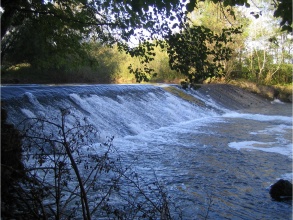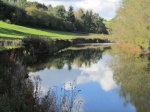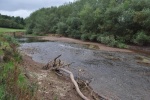Case study:Kentchurch Weir Removal: Difference between revisions
No edit summary |
SFW Nikhil (talk | contribs) No edit summary |
||
| Line 19: | Line 19: | ||
|Project summary=In 2008, EA Wales and Atkins completed a project to install a fish pass at Osbaston, downstream of Kentchurch Weir - to improve fish passage upstream. However, the 2 metre high Kentchurch Weir posed as a significant and impassable barrier to fish passage further upstream. A £100,000, 18 month-long project was undertaken, beginning in 2008, to remove this structure and open up the upper reaches of the Monnow. | |Project summary=In 2008, EA Wales and Atkins completed a project to install a fish pass at Osbaston, downstream of Kentchurch Weir - to improve fish passage upstream. However, the 2 metre high Kentchurch Weir posed as a significant and impassable barrier to fish passage further upstream. A £100,000, 18 month-long project was undertaken, beginning in 2008, to remove this structure and open up the upper reaches of the Monnow. | ||
}} | }} | ||
{{Image gallery}} | |||
{{Case study image | |||
|File name=KENTCHURCH PRE.jpg | |||
}} | |||
{{Case study image | |||
|File name=KENTCHURCH POST.jpg | |||
}} | |||
{{Image gallery end}} | |||
{{Toggle button}} | |||
{{Toggle content start}} | |||
{{Case study subcatchment | {{Case study subcatchment | ||
|Subcatchment=Monnow | |Subcatchment=Monnow | ||
| Line 71: | Line 82: | ||
{{Monitoring documents}} | {{Monitoring documents}} | ||
{{Monitoring documents end}} | {{Monitoring documents end}} | ||
{{Additional Documents}} | {{Additional Documents}} | ||
{{Additional Documents end}} | {{Additional Documents end}} | ||
| Line 87: | Line 89: | ||
|Information=Considered to be the largest ever weir removal undertaken in Wales. Removal has allowed 160km of the Monnow catchment to be restored to its natural condition of flow and connectivity. | |Information=Considered to be the largest ever weir removal undertaken in Wales. Removal has allowed 160km of the Monnow catchment to be restored to its natural condition of flow and connectivity. | ||
}} | }} | ||
{{Toggle content end}} | |||
Revision as of 10:55, 6 September 2013
Project overview
| Status | Complete |
|---|---|
| Project web site | |
| Themes | Habitat and biodiversity |
| Country | England, Wales |
| Main contact forename | Nick |
| Main contact surname | Elbourne |
| Main contact user ID | User:NickRRC |
| Contact organisation | River Restoration Centre |
| Contact organisation web site | |
| Partner organisations | Environment Agency Wales, Atkins |
| Parent multi-site project | |
| This is a parent project encompassing the following projects |
No |
Project summary
In 2008, EA Wales and Atkins completed a project to install a fish pass at Osbaston, downstream of Kentchurch Weir - to improve fish passage upstream. However, the 2 metre high Kentchurch Weir posed as a significant and impassable barrier to fish passage further upstream. A £100,000, 18 month-long project was undertaken, beginning in 2008, to remove this structure and open up the upper reaches of the Monnow.
Monitoring surveys and results
Lessons learnt
Image gallery
|
Catchment and subcatchmentSelect a catchment/subcatchment
Site
Project background
Cost for project phases
Reasons for river restoration
Measures
MonitoringHydromorphological quality elements
Biological quality elements
Physico-chemical quality elements
Any other monitoring, e.g. social, economic
Monitoring documents
Additional documents and videos
Additional links and references
Supplementary InformationEdit Supplementary Information Considered to be the largest ever weir removal undertaken in Wales. Removal has allowed 160km of the Monnow catchment to be restored to its natural condition of flow and connectivity.
| ||||||||||||||||||||||||||||||||||||||||||||||||||||||||||||||||||||||||||||||||||||||||||||||||||||||||||||||||||||||||||||||||||||||||||||||||||||||||||||||||||||||||||||||||||||||



